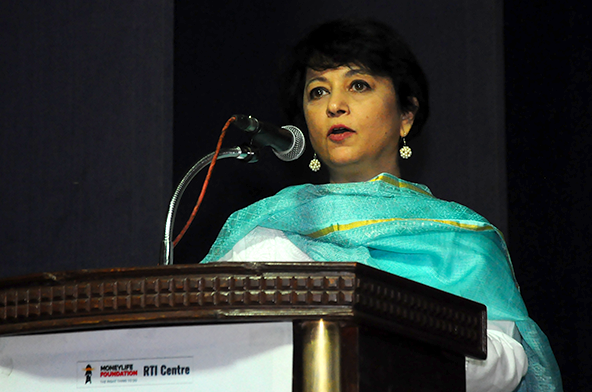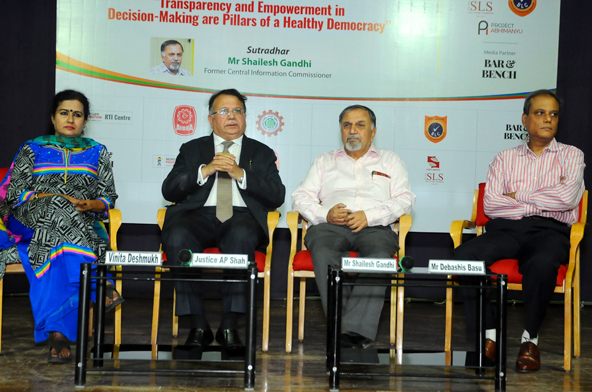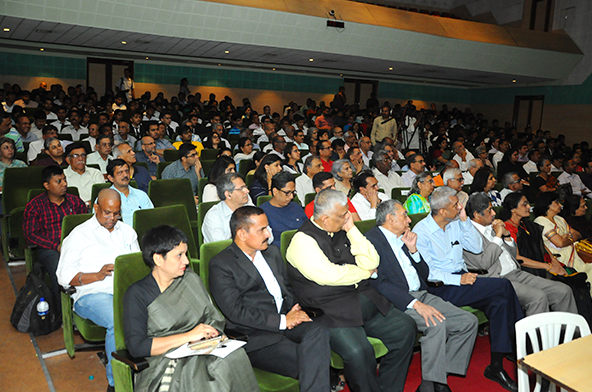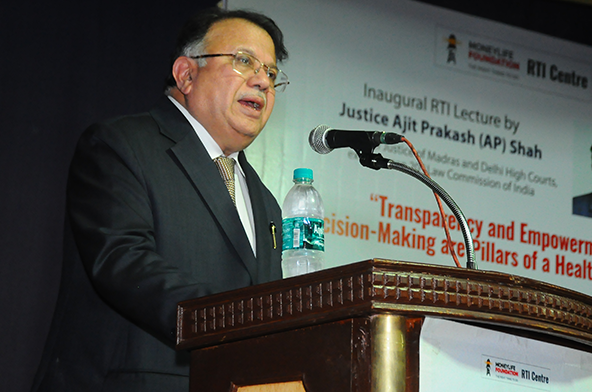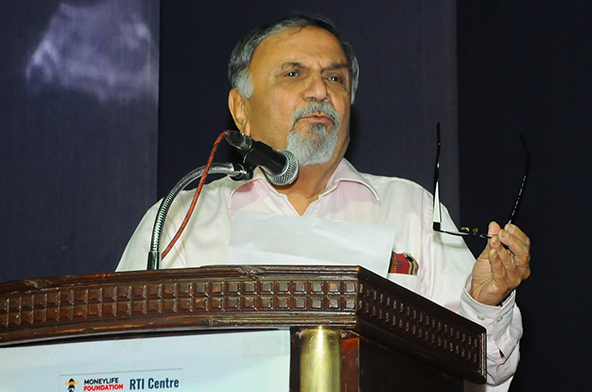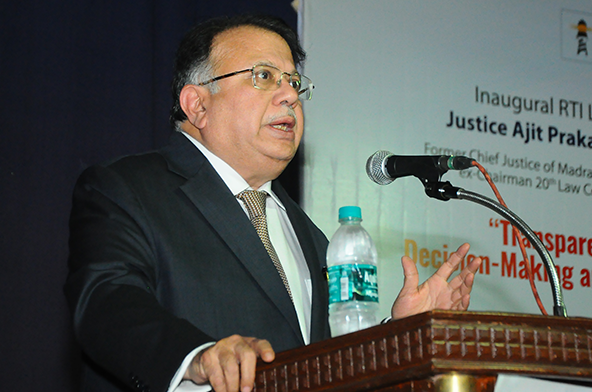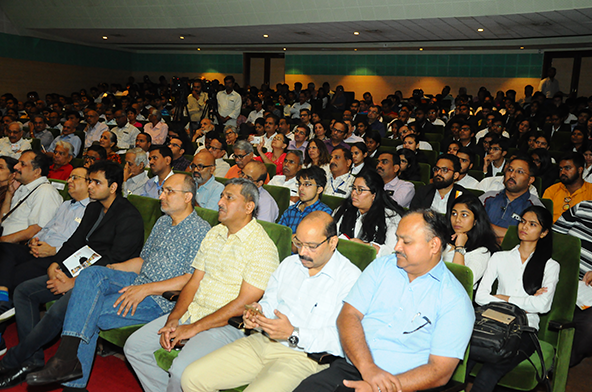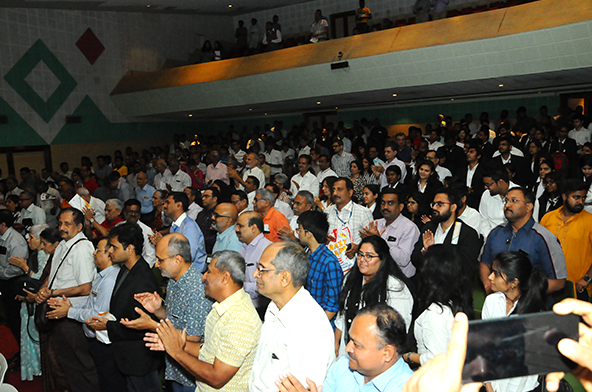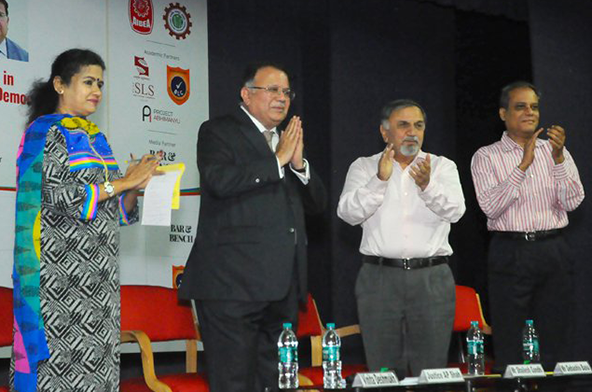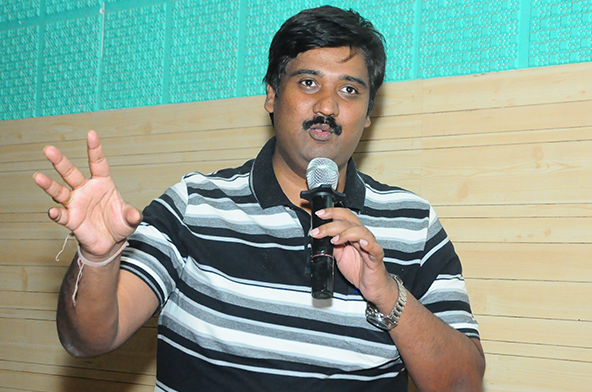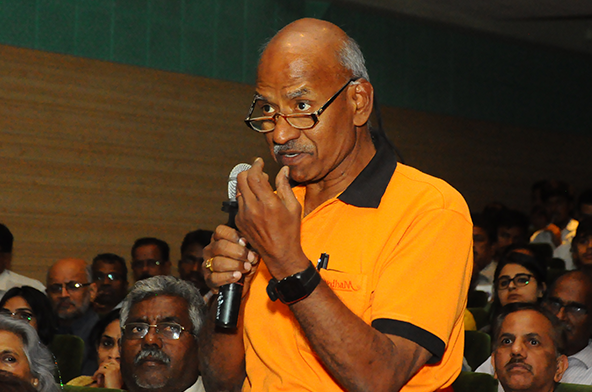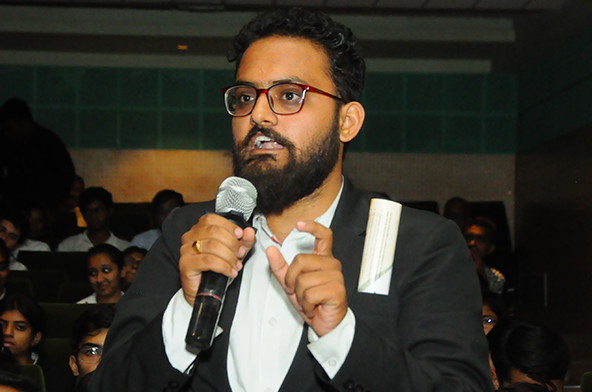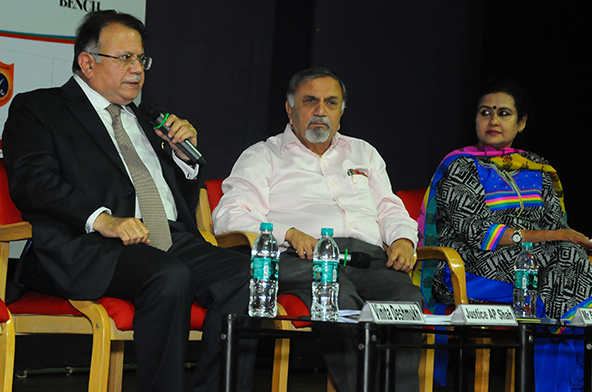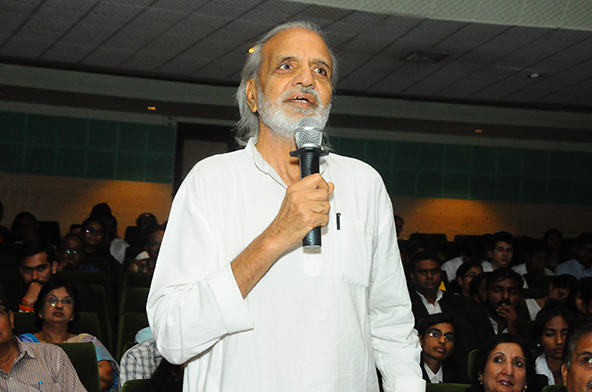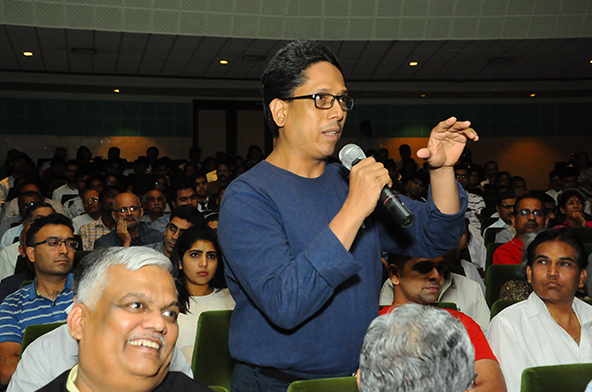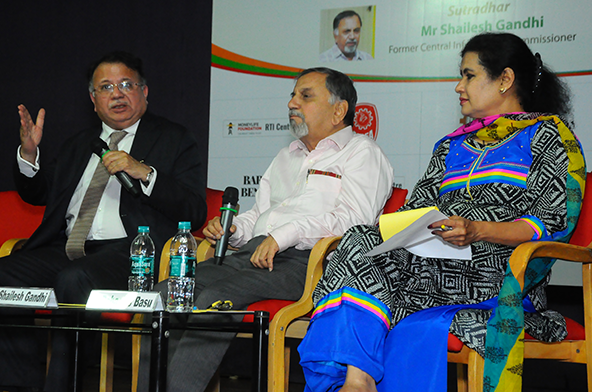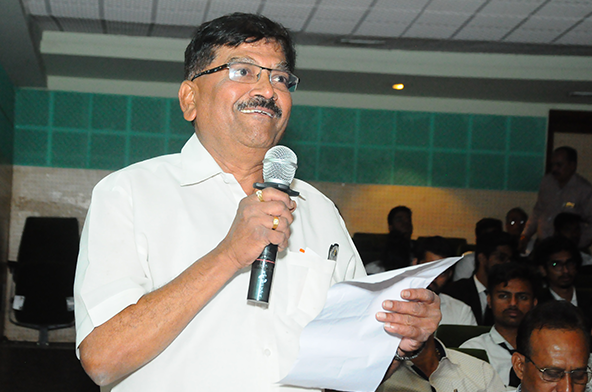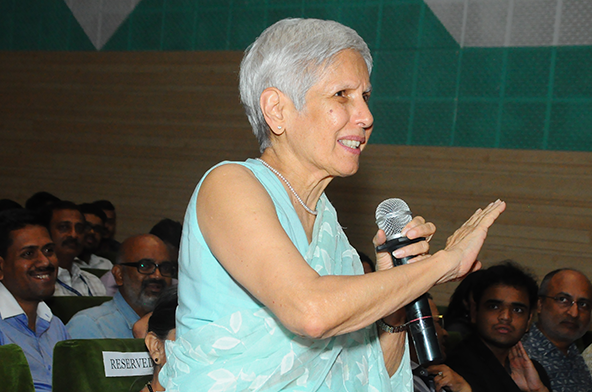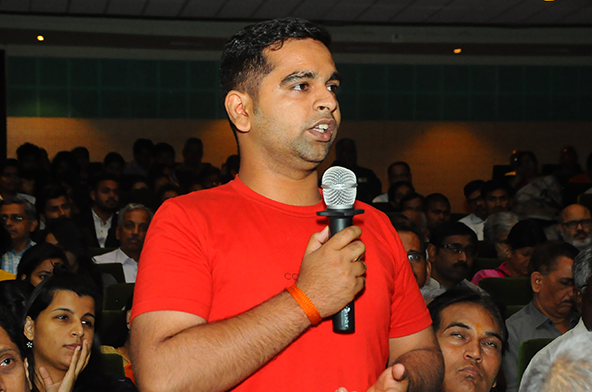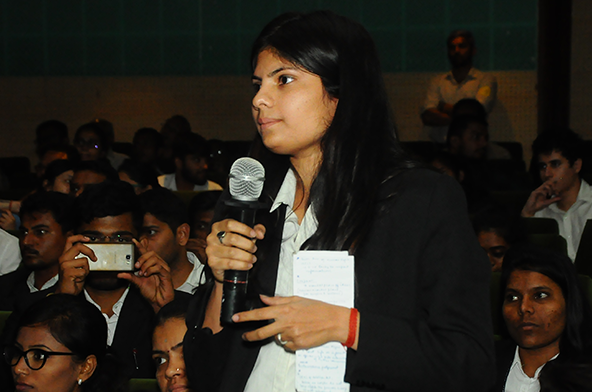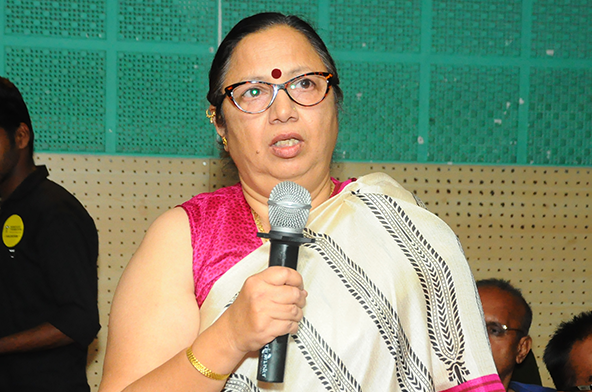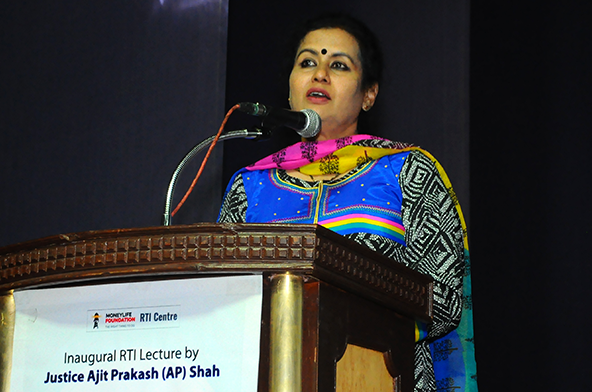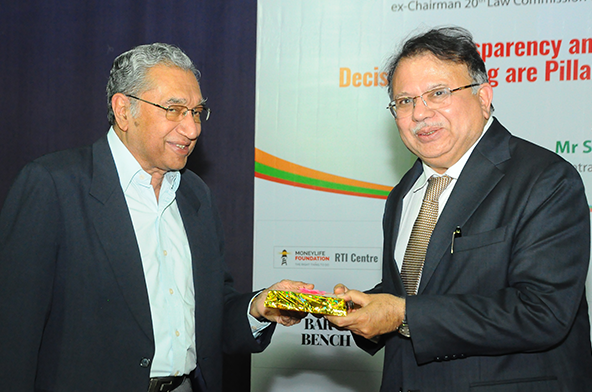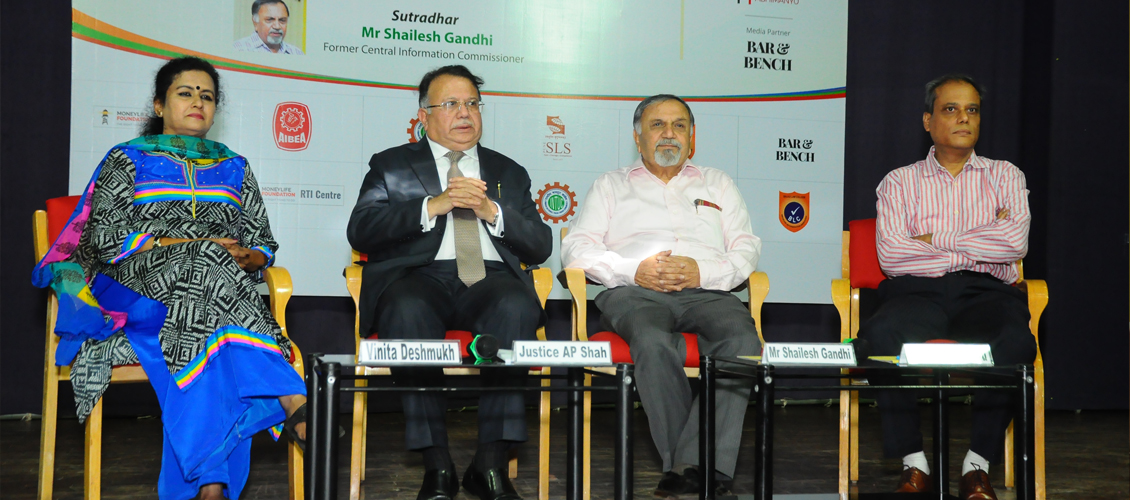
“We are today living in the age of propaganda, and proactive false information, and half truths. The media coverage, or rather black out, of certain press conferences, and distorting headlines with a pro-government bias, is an attempt to spread disinformation. The right to freedom of speech and expression is under attack. Unless, we as ordinary citizens do not rise up and demand accountability from the government, there will be no change in the situation,” said Justice AP Shah in a scintillating speech that covered a wide range of issues — right to information, accountability, freedom of speech, whistleblowers, Lokpal, privacy and many other issues. He was speaking on “Transparency and Empowerment in Decision-Making are Pillars of a Healthy Democracy” at the Inaugural RTI Lecture organised by Moneylife Foundation’s RTI Centre at Pune.
Justice Shah said, “Today, we are living in a world where we are told what we can and cannot eat, what we can and cannot see, and what we can and cannot speak about. Dissent, especially in the university space and in popular culture, is being curbed. We have journalists who are shot dead at point blank rage, merely for the views they hold and propagate. We have movie producers and directors who are forced to make edits in their scenes and issue disclaimers, despite CBFC clearance, so as to not offend the sentiments of a single community. Think of the controversies surrounding Padmavat, Lipstick under the Burkha, S Durga, or Jolly LLB, and you will realise that we are living in an increasingly intolerant society.”
“More importantly, in this age of mass-communication and digital media, the media assumes an even greater importance in playing the role of the opposition and checking facts. In fact, no other institution wields as much power and influence on public opinion as the media. However, in recent times, a section of the media, rather vast section of media, particularly electronic media, through its biased and one-sided reporting, has unfortunately aided in the restriction on free speech. Media have become propaganda machine, if not anything else. It is thus not an exaggeration to state that our institutions are under attack today and there is a concerted attempt to destroy any independent thought. Think of the weakened Election Commission or the Central Vigilance Commissioner’s office, once beacons of independence. Today, if anyone holds a view that is different from the government’s ‘acceptable’ view, they are immediately dubbed as ‘anti-national’, with a view to intimidate and browbeat voices of dissent and criticism, especially through severe online harassment, trolling and abuse,” the former Chief Justice of Delhi and Madras High Courts said.
Commenting on political parties and the RTI Act, the former Chief Justice said “Political parties have historically been resistant to being placed under the RTI Act, on the ground that they are not ‘public authority’ and that ‘revealing names of their donors might endanger the donors` lives’ and that ‘it would impact the parties’ decision-making process’. I am of the firm view that placing political parties under the ambit of the RTI Act will open politics to public scrutiny, regulate political party funding and clean up our electoral ecosystem. This is especially important given the incentive structures underlying the financial model of politics in India.”
Last month, the Supreme Court in its decision in Lok Prahari v Union of India ruled that election candidates must disclose not only their sources of income, but also the source of income of their respective associates (spouses/dependants). The Court cited its previous decision in UOI v ADR, (2002) 5 SCC 294 which held the importance of information of prospective candidates, including their assets and liabilities, criminal antecedents, and educational qualifications. Notably, in PUCL v UOI, (2003) 4 SCC 399, the Court also recorded that s. 33A of the Representation of People Act fails to ensure complete compliance with the directions issued by the Court in ADR case, Justice Shah pointed out.
Talking about Right to Information and Right to Privacy, Justice Shah said, “Section 8(1)(j) of the RTI Act provides an exception to the disclosure of information ‘which relates to personal information… which has no relationship to any public activity or interest, or which would cause an unwarranted invasion of privacy’. The problem arises because the RTI Act does not define the term ‘privacy’ or ‘public activity’ or ‘unwarranted invasion’, thus giving wide leeway to public information officers (PIOs) to reject genuine RTI requests on such grounds.”
Pointing out privacy claims of pubic authorities and public functionaries are distinctly different from the privacy expectations of private individuals, Justice Shah said, “This is because, it is well recognised, through a series of judgments, that public officials by virtue of their position, have a lower claim to privacy, since they are exercising their functions as trustees.”
“While the Justice Puttaswamy judgment has clarified that the right to privacy is a fundamental, constitutional right, inherent in Articles 14, 19, 21 and other Articles, it did not have occasion to define the scope and contours of the right to privacy. In fact, the judgment has created some uncertainty about how the right to privacy will now interact with the right to access information, especially when it concerns sensitive topics such as the degree of the Prime Minister or the assets and liabilities of public servants, or their performance evaluation reports. It is important to note that information regarding the names of all students who graduated from college, is readily provided by prominent foreign universities,” he added.
According to the former Judge, who is known for his bold decisions, RTI Act, Right to Privacy and the Aadhaar Act compounds further problems for citizens. He said, “The Aadhaar Act further compounds problems, especially when we consider the right to information concerning one self. While the RTI Act regulates the citizen’s right to information regarding third party public authorities, the Aadhaar Act is concerned with the right to access information about one self. Shockingly, the proviso to sec. 28(5) of the Aadhaar Act has made it clear that an Aadhaar number holder does not have the right to access core biometric information about themselves – what this means is that while the State has access to my fingerprint and iris scan in their Central Identity Database Repository, I, myself, am prohibited from accessing this information!!!”
“Indian law is well settled in its recognition of a constitutional and statutory basis of the right to information,” Justice Shah said adding, “Unfortunately, however, the record of the Indian judiciary in guaranteeing that right is mixed. For every pronouncement such as SP Gupta and Raj Narain cases, there is judicial decision by evasion. This is best illustrated by the fact that the appeal filed by the Supreme Court to itself against the 2009 decision of the Delhi High Court in Subhash Chandra Aggarwal, is still pending in the Supreme Court, even after nine years. Meanwhile the effect of the High Court judgment has been nullified.”
Justice Shah also expressed concern over non-operationalisation of the Whistle Blower’s Protection Act and the Lokpal Act. The Whistle Blowers Protection Act was passed by Parliament in February 2014 after a sustained campaign by activists and families of slain whistle blowers.
Justice Shah said, “Despite the passage of more than three years since the law was approved by Parliament, whistle blowers continue to pay a heavy price for exposing corruption and wrongdoing, as the government has still not operationalised the Act. Instead, it moved an amendment bill in May 2015, which seeks to severely dilute the Act.”
The amendment bill seeks to remove safeguards available to whistle blowers from prosecution under the Official Secrets Act and also introduces wide-ranging exclusions by stating that disclosures should not contain information which would prejudicially affect the sovereignty, integrity, security, strategic, scientific or economic interests of the State.
“The non-operationalisation of the Whistle Blowers Act is also accompanied by the non-operationalisation Lokpal & Lokayuktas Act. While there is perceived incorruptibility around the Prime Minister, that itself is no reason to discard or dilute existing laws promoting proactive oversight and audit of government actions, especially since the problem of corruption and opacity in the functioning of the lower levels of government remain,” he added.
According to the former Chief Justice, Section 4 of the RTI Act is one of the most critical sections of the RTI Act. He said, “It (Section) requires the government to proactively disclose information on a range of issues and is the future direction of the transparency law. Unfortunately, there has been no systematic effort by the government to improve the implementation of proactive disclosures: research has shown that nearly 70% of all RTI applications ask for information that should have been proactively disclosed. In 2015, the Prime Minister had drawn the link between the RTI Act and good governance at the CIC convention, requiring public authorities to analyse the RTI applications received by them to identify weaknesses in the functioning of the public authority. However, it appears that there has been no action on the suggestions of the Prime Minister.”
“This is unfortunate since the government should be moving towards a system where all information, save what is exempt under Section 8, is proactively available to citizens. In fact, the hallmark of a democracy is that citizens have the right to question the government on its actions. This is possible only if proper information about government decisions and policies is provided to people. The trend of making claims and taking policy decisions without adequate information is very dangerous. We have seen that several recent claims of the government have not withstood fact checking and interrogation through RTI and media,” Justice Shah added.
Many prominent citizens, including activists and bank employees associated with All India Bank Employees Association (AIBEA) and Indian National Bank Employees’ Federation, a banking wing of INTUC were present during the RTI Lecture.
Earlier in a 2010 judgment, a Delhi High Court Bench headed by then Chief Justice Shah, had hailed Right to Information (RTI) Act as the most significant event in Indian democracy. The Bench, while ruling that the office of the Chief Justice of India comes within the ambit of the RTI Act, had said, “Democracy expects openness and openness is concomitant of free society. Sunlight is the best disinfectant. Information is currency that every citizen requires to participate in the life and governance of the society. In any democratic polity, greater the access, greater will be the responsiveness and greater the restrictions, greater the feeling of powerlessness and alienation.”
Shailesh Gandhi, former Central Information Commissioner was the sutradhaar for the RTI Lecture.
Several students from Symbiosis Law College, Balaji Law College and those associated with Project Abhimanyu were present to listen to Justice Shah, one of most bold and liberal legal luminaries in India. The event was supported by AIBEA, INBEF, Symbiosis Law College, Balaji Law College, Project Abhimanyu and Bar & Bench as media partner.
Justice Shah’s lecture will remain as one of the strongest defence of transparency and empowerment in decision making for a constitutional democracy like India, and it would serve us well to pay heed to the former chief justice of Delhi High Court, who is a leading light of the struggle to regain India’s lost freedom.


